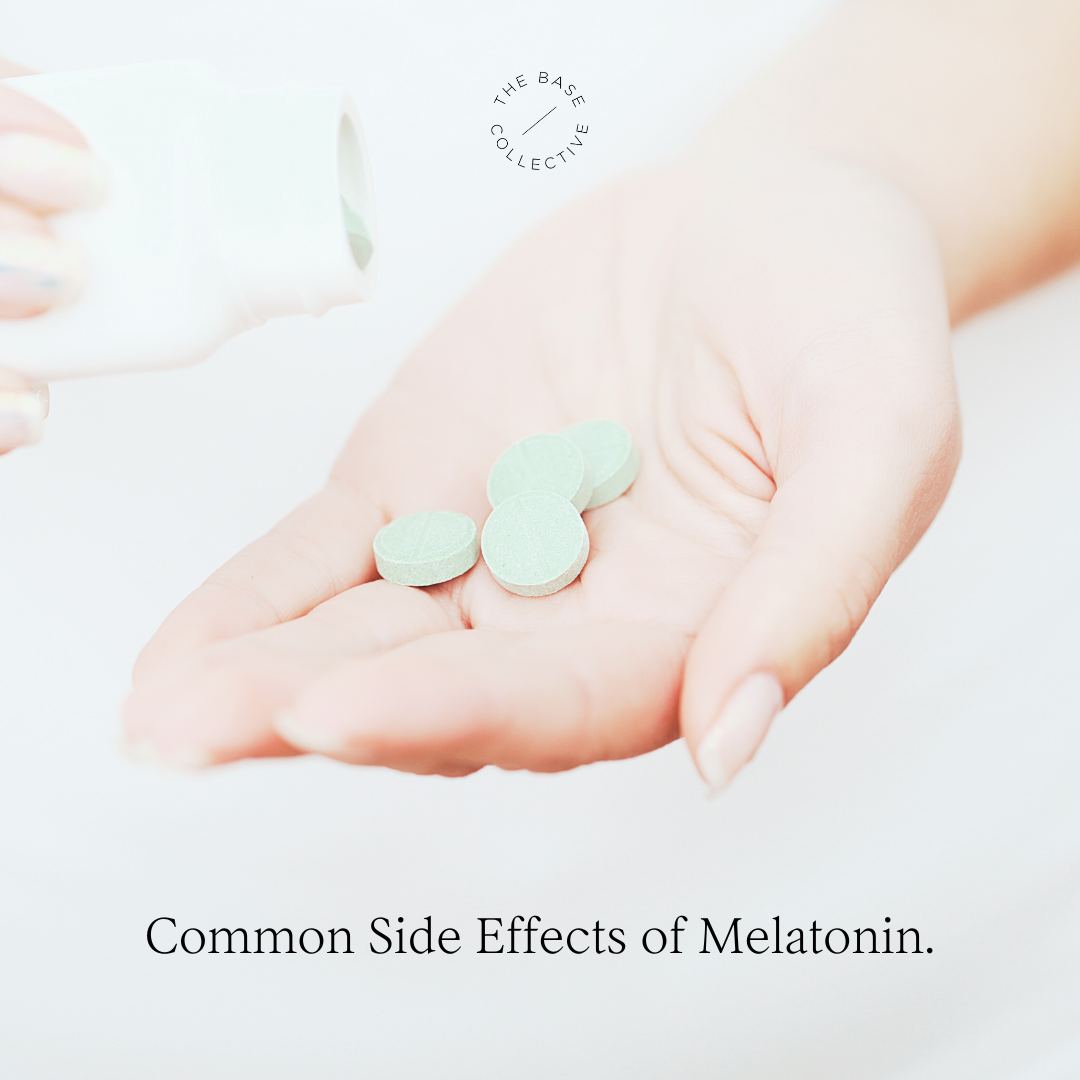
Common Side Effects of Melatonin
Melatonin is a hormone that plays a crucial role in regulating the sleep-wake cycle. It is produced by the pineal gland, a small gland located in the brain, and its primary function is to signal to the body that it’s time to sleep. Melatonin levels naturally rise in the evening as it gets darker and drop in the morning with the onset of daylight, helping to maintain the body’s circadian rhythm.
Beyond sleep regulation, melatonin also acts as an antioxidant, supports immune function, and helps to control body temperature. It is vital for maintaining a healthy sleep cycle, which, in turn, impacts overall well-being.
How the Body Naturally Produces Melatonin
The body’s production of melatonin is intricately linked to the circadian rhythm, often referred to as the body’s internal clock. The pineal gland produces melatonin in response to darkness, making it easier to fall asleep at night. However, this process depends on several key factors:
Light Exposure and Circadian Rhythm
Exposure to natural light during the day and darkness at night is crucial for maintaining a healthy circadian rhythm. When you are exposed to bright light during the day, especially in the morning, your body’s production of melatonin is suppressed, helping you stay awake. Conversely, reducing light exposure in the evening signals your body to start producing melatonin, preparing you for sleep.
Nutritional Requirements: The Role of Magnesium
Magnesium is an essential mineral that supports various bodily functions, including melatonin production. It acts as a cofactor in the synthesis of melatonin, ensuring that your body has the resources it needs to produce this vital hormone. Without adequate magnesium, your body’s ability to produce melatonin may be compromised, potentially leading to sleep disturbances.
Incorporating magnesium-rich foods into your diet, such as leafy greens, nuts, seeds, and whole grains, can support melatonin synthesis. Additionally, using products like our Sleep Magnesium Spray before bed can further enhance your body’s natural production of melatonin.
The Impact of Stress and Relaxation
Stress can significantly impact melatonin production. When you are stressed, your body produces cortisol, a hormone that can inhibit melatonin synthesis. This is why relaxation techniques, such as meditation, deep breathing, and using calming products, are essential for promoting natural melatonin production.
Establishing a consistent bedtime routine that includes relaxation practices, such as using our Beauty Sleep Wash one hour before bed, can help reduce stress and support your body’s ability to produce melatonin naturally. The natural ingredients, combined with the raising and lowering your body temperature via a warm shower helps to signal to your body to start making melatonin.
Common Side Effects of Synthetic Melatonin Supplements
While melatonin supplements are widely used to aid sleep, they are not without potential side effects. Although generally considered safe, some individuals may experience adverse effects, particularly with prolonged or high-dose use. Common side effects include:
Drowsiness and Daytime Fatigue
One of the most common side effects of melatonin supplements is drowsiness, which can extend into the following day, leading to daytime fatigue. This can be particularly problematic if you need to stay alert and focused during the day.
Hormonal Imbalance
Melatonin is a hormone, and taking it in supplement form can potentially interfere with the body’s hormonal balance. Long-term use may affect reproductive hormones, especially in women, leading to irregular menstrual cycles or other hormonal disruptions.
Digestive Issues
Some people may experience digestive issues, such as nausea, cramps, or diarrhea, after taking melatonin supplements. These side effects are typically mild but can be uncomfortable, especially if melatonin is taken frequently.
Headaches and Dizziness
Headaches and dizziness are also reported side effects of melatonin supplementation. These symptoms can occur when melatonin levels in the body become too high or if the body reacts poorly to the synthetic hormone.
Potential Mood Changes
Melatonin can also influence mood. Some users have reported feelings of depression or irritability after taking melatonin supplements. While these effects are less common, they highlight the importance of monitoring your response to melatonin and adjusting your usage accordingly.
How to Support Your Body’s Natural Melatonin Production
Enhancing your body’s natural ability to produce melatonin can help you avoid the side effects associated with synthetic supplements. By focusing on key lifestyle changes and incorporating specific products into your routine, you can support and boost natural melatonin production effectively.
The Role of Magnesium in Melatonin Synthesis
Magnesium is a crucial element in the body’s melatonin production process. This mineral not only supports overall relaxation and stress reduction but also directly contributes to the synthesis of melatonin in the pineal gland. Ensuring adequate magnesium levels can help your body produce melatonin more efficiently, promoting better sleep.
One effective way to boost your magnesium levels is by using a Sleep Magnesium Spray before bedtime. This topical application allows magnesium to be absorbed through the skin, providing a calming effect that prepares your body for sleep and enhances melatonin production naturally.
Incorporating a Relaxing Evening Routine
Creating a consistent, calming evening routine is essential for supporting natural melatonin production. The body responds positively to regular habits, and establishing a pre-sleep ritual can signal to your brain that it’s time to wind down and prepare for rest.
One way to enhance your evening routine is by using our Beauty Sleep Wash one hour before bed. This product not only cleanses your skin but also contains ingredients that promote relaxation, helping to reduce stress and create an ideal environment for melatonin production. Consistency is key, so make this a regular part of your nightly routine.
The Importance of a Sleep-Conducive Environment
The environment in which you sleep plays a significant role in your body’s ability to produce melatonin. A dark, quiet, and comfortable sleep space can enhance melatonin production and improve overall sleep quality.
Consider dimming the lights in your home an hour or two before bed, and limit exposure to blue light from screens, as it can interfere with melatonin production. Creating a comfortable sleep environment by adjusting the room temperature, using blackout curtains, and ensuring your bedding is cozy can also contribute to better sleep.
Why Choose Natural Over Synthetic Melatonin?
While synthetic melatonin supplements can be helpful in certain situations, relying on natural melatonin production is often a healthier long-term strategy. Supporting your body’s natural processes can lead to more sustainable and balanced sleep patterns, free from the side effects associated with synthetic melatonin.
Reducing Dependency on Supplements
One of the primary concerns with synthetic melatonin is the potential for dependency. Over time, your body might become reliant on external sources of melatonin, making it more difficult to fall asleep without the supplement. By focusing on natural methods, you reduce the risk of dependency and allow your body to regulate its melatonin levels more effectively.
Long-Term Benefits of Natural Melatonin Production
Natural melatonin production aligns with your body’s circadian rhythm, leading to more restful and restorative sleep. In the long term, supporting this natural process can improve not only sleep quality but also overall health. Better sleep has been linked to improved cognitive function, mood stability, and immune system strength.
Enhancing Overall Well-Being by Avoiding Side Effects
By avoiding synthetic melatonin, you also sidestep the potential side effects such as hormonal imbalances, daytime drowsiness, and digestive issues. Natural melatonin production is more harmonious with your body’s needs and rhythms, promoting a sense of well-being without the drawbacks of supplements.
Prioritize Natural Melatonin Production for a Healthier Sleep Cycle
To avoid the common side effects of synthetic melatonin supplements, it’s beneficial to focus on enhancing your body’s natural melatonin production. By incorporating magnesium-rich products, establishing a consistent bedtime routine, and creating a sleep-conducive environment, you can support your body’s natural processes and enjoy a healthier, more restorative sleep cycle.
The information provided by The Base Collective is not intended to be used as medical advice and should not take the place of professional or medical advice. Always seek the guidance of your doctor or other qualified health professionals with any questions you may have regarding your health or medical condition.







Leave a comment
This site is protected by hCaptcha and the hCaptcha Privacy Policy and Terms of Service apply.